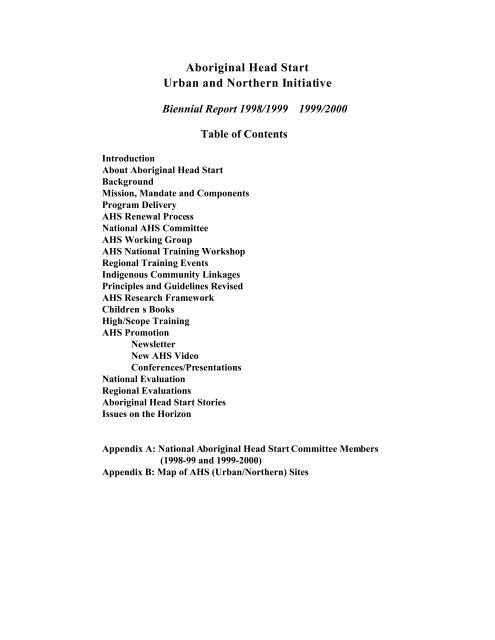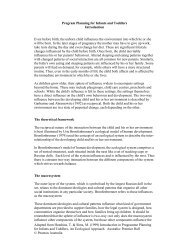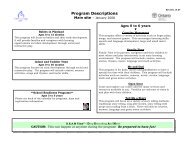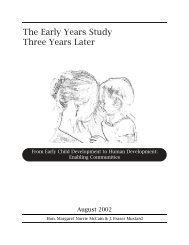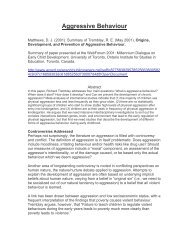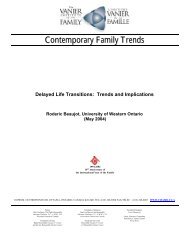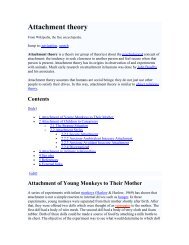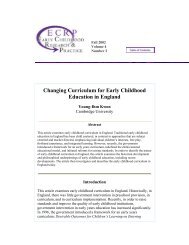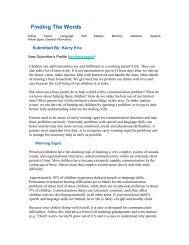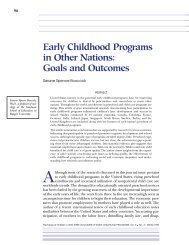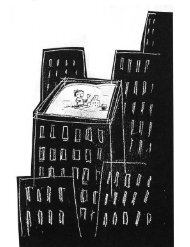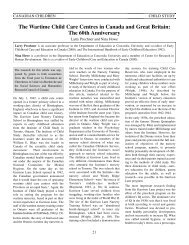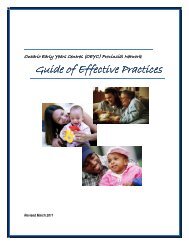Aboriginal Head Start Urban and Northern Initiative - Peel Early Years
Aboriginal Head Start Urban and Northern Initiative - Peel Early Years
Aboriginal Head Start Urban and Northern Initiative - Peel Early Years
You also want an ePaper? Increase the reach of your titles
YUMPU automatically turns print PDFs into web optimized ePapers that Google loves.
<strong>Aboriginal</strong> <strong>Head</strong> <strong>Start</strong><br />
<strong>Urban</strong> <strong>and</strong> <strong>Northern</strong> <strong>Initiative</strong><br />
Biennial Report 1998/1999 1999/2000<br />
Table of Contents<br />
Introduction<br />
About <strong>Aboriginal</strong> <strong>Head</strong> <strong>Start</strong><br />
Background<br />
Mission, M<strong>and</strong>ate <strong>and</strong> Components<br />
Program Delivery<br />
AHS Renewal Process<br />
National AHS Committee<br />
AHS Working Group<br />
AHS National Training Workshop<br />
Regional Training Events<br />
Indigenous Community Linkages<br />
Principles <strong>and</strong> Guidelines Revised<br />
AHS Research Framework<br />
Children s Books<br />
High/Scope Training<br />
AHS Promotion<br />
Newsletter<br />
New AHS Video<br />
Conferences/Presentations<br />
National Evaluation<br />
Regional Evaluations<br />
<strong>Aboriginal</strong> <strong>Head</strong> <strong>Start</strong> Stories<br />
Issues on the Horizon<br />
Appendix A: National <strong>Aboriginal</strong> <strong>Head</strong> <strong>Start</strong> Committee Members<br />
(1998-99 <strong>and</strong> 1999-2000)<br />
Appendix B: Map of AHS (<strong>Urban</strong>/<strong>Northern</strong>) Sites
<strong>Aboriginal</strong> <strong>Head</strong> <strong>Start</strong><br />
Biennial Report 1998/2000<br />
Introduction<br />
Welcome to the 1998-2000 <strong>Aboriginal</strong><br />
<strong>Head</strong> <strong>Start</strong> (<strong>Urban</strong> <strong>and</strong> <strong>Northern</strong><br />
Communities) Biennial Report.<br />
This report provides information about<br />
the <strong>Aboriginal</strong> <strong>Head</strong> <strong>Start</strong> (AHS)<br />
program in urban <strong>and</strong> northern<br />
communities for the period of April 1,<br />
1998 - March 31, 2000. This information<br />
provides an overview of activities <strong>and</strong><br />
accomplishments in this two-year period.<br />
It describes the efforts of our entire team<br />
working in the communities, in the<br />
regions <strong>and</strong> at the national level.<br />
The objectives of this biennial report are:<br />
ÿÿ to provide a communication tool<br />
that describes the diversity of<br />
<strong>Aboriginal</strong> community-based<br />
efforts to projects <strong>and</strong> interested<br />
stakeholders;<br />
ÿÿ to communicate the AHS program<br />
successes during 1998/1999 -<br />
1999/2000;<br />
ÿÿ to share the benefits of the AHS<br />
initiative to our stakeholders <strong>and</strong><br />
project sponsors; <strong>and</strong> the direction<br />
over the course of the last two<br />
years; <strong>and</strong><br />
ÿÿ to promote <strong>and</strong> support the<br />
development of AHS programs in<br />
urban <strong>and</strong> northern communities<br />
across the country.<br />
The Biennial Report (1998-2000) is<br />
also available on the <strong>Aboriginal</strong> <strong>Head</strong><br />
<strong>Start</strong> Website at:<br />
http://www.hc-sc.gc.ca/ahs,<br />
or by writing to:<br />
<strong>Aboriginal</strong> Childhood <strong>and</strong> Youth<br />
Childhood <strong>and</strong> Youth Division<br />
Health Canada<br />
Address locator 1909C2<br />
Tunney's Pasture<br />
Ottawa, Ontario<br />
K1A 1B4<br />
The Website also contains information<br />
about each individual AHS site.<br />
About <strong>Aboriginal</strong> <strong>Head</strong> <strong>Start</strong><br />
The <strong>Aboriginal</strong> <strong>Head</strong> <strong>Start</strong> (AHS) <strong>Urban</strong><br />
<strong>and</strong> <strong>Northern</strong> Program is a Health<br />
Canada-funded early intervention<br />
program focused on meeting the early<br />
developmental needs of young <strong>Aboriginal</strong><br />
children living in urban centres <strong>and</strong> large<br />
northern communities.<br />
Generally, AHS projects operate four<br />
days per week, with 30-40 children 3-5<br />
years old, in morning <strong>and</strong> afternoon<br />
sessions, in a structured pre-school<br />
environment. <strong>Aboriginal</strong> <strong>Head</strong> <strong>Start</strong><br />
projects are run by locally managed<br />
<strong>Aboriginal</strong> non-profit organizations that<br />
see the parent/care giver as the natural<br />
advocate of the child.<br />
Projects link <strong>and</strong> coordinate with other<br />
programs <strong>and</strong> services in their<br />
communities, such as specialist health or<br />
education services, that are provided by<br />
provincial or territorial governments.<br />
Background<br />
In the January 1994 Speech from the<br />
Throne, the federal government<br />
announced its intention to establish an<br />
<strong>Aboriginal</strong> <strong>Head</strong> <strong>Start</strong> <strong>Initiative</strong>. In May<br />
1
<strong>Aboriginal</strong> <strong>Head</strong> <strong>Start</strong><br />
Biennial Report 1998/2000<br />
1995, the then Minister of Health, the<br />
Honourable Diane Marleau announced a<br />
four-year pilot phase to begin the<br />
program. Following successful<br />
completion of the pilot phase, AHS<br />
became a program funded on an ongoing<br />
basis. The national funding level for<br />
fiscal years 1998-99 <strong>and</strong> 1999-2000 was<br />
$22.5 million annually. Annual ongoing<br />
funding for the AHS initiative in urban<br />
<strong>and</strong> northern communities from Health<br />
Canada is $22.5 million.<br />
The federal government s commitment to<br />
<strong>Aboriginal</strong> children through this initiative<br />
has resulted in approximately 3,300<br />
<strong>Aboriginal</strong> children being enrolled<br />
annually in over 100 AHS projects in<br />
urban <strong>and</strong> northern communities<br />
nationwide in 1998. The program has<br />
generated significant excitement<br />
throughout the Canadian <strong>Aboriginal</strong><br />
community. Project reports gathered to<br />
date clearly indicate that parents are<br />
gaining valuable skills <strong>and</strong> knowledge<br />
<strong>and</strong> children are enhancing their<br />
development <strong>and</strong> readiness to learn.<br />
AHS has supported the growth <strong>and</strong><br />
establishment of effective <strong>Aboriginal</strong><br />
child development projects across the<br />
country. <strong>Aboriginal</strong> communities have<br />
been able to build their own capacities<br />
through the course of project<br />
development, which create healthier<br />
environments with professionally trained<br />
staff.<br />
Parents of children in the program, <strong>and</strong><br />
the larger <strong>Aboriginal</strong> community,<br />
continue to have responsibility in the<br />
design <strong>and</strong> delivery of local AHS<br />
programming. Parent committees are a<br />
central feature of the AHS program, <strong>and</strong><br />
share in the management <strong>and</strong> operations<br />
of projects.<br />
Regional Offices of Health Canada<br />
administer the contribution agreements<br />
for projects <strong>and</strong> provide project<br />
monitoring for purposes of accountability<br />
<strong>and</strong> financial administration. The primary<br />
regional contact for AHS projects is the<br />
regional program consultant. AHS<br />
program consultants are available to<br />
assist <strong>and</strong> support the work of AHS<br />
projects. Roles fulfilled by the program<br />
consultants include various aspects of<br />
community development, providing<br />
advice <strong>and</strong> assistance, facilitating<br />
regional training workshops annually for<br />
project coordinators, parents <strong>and</strong> staff,<br />
service delivery <strong>and</strong> operational support<br />
<strong>and</strong> outreach by providing sites with<br />
access to training initiatives which enable<br />
staff to provide culturally appropriate<br />
services to the communities they serve.<br />
Assistance to <strong>Aboriginal</strong> <strong>Head</strong> <strong>Start</strong><br />
projects also comes from the AHS<br />
National Office, located in Health<br />
Canada s national office in Ottawa.<br />
Support from this office includes training,<br />
national coordination, national<br />
communications <strong>and</strong> linkages, facilitation<br />
of a national committee, national<br />
evaluation <strong>and</strong> the hosting of an annual<br />
National Training Workshop, <strong>and</strong> other<br />
national projects that arise from time to<br />
time.<br />
Program Mission, M<strong>and</strong>ate<br />
And Components<br />
Mission<br />
First Nations people, Metis <strong>and</strong> Inuit<br />
recognize children as their nations most<br />
valuable resources. Therefore, the<br />
2
<strong>Aboriginal</strong> <strong>Head</strong> <strong>Start</strong><br />
Biennial Report 1998/2000<br />
<strong>Aboriginal</strong> <strong>Head</strong> <strong>Start</strong> <strong>Initiative</strong> provides<br />
comprehensive experiences for First<br />
Nations, Metis <strong>and</strong> Inuit children up to 6<br />
years of age <strong>and</strong> their families, with<br />
primary emphasis on preschoolers, 3-5<br />
years of age. The program is based on<br />
caring, creativity <strong>and</strong> pride following<br />
from the knowledge of their traditional<br />
community beliefs, within a holistic <strong>and</strong><br />
safe environment.<br />
M<strong>and</strong>ate<br />
The primary goal of the AHS <strong>Initiative</strong> is<br />
to demonstrate that locally controlled <strong>and</strong><br />
designed early intervention strategies can<br />
provide <strong>Aboriginal</strong> preschool children in<br />
urban <strong>and</strong> northern settings with a<br />
positive sense of themselves, a desire for<br />
learning <strong>and</strong> opportunities to develop<br />
fully <strong>and</strong> successfully as young people.<br />
Components<br />
<strong>Aboriginal</strong> <strong>Head</strong> <strong>Start</strong> programming is<br />
organized around the following six<br />
components:<br />
1. Culture <strong>and</strong> Language - provides<br />
children with a positive sense of<br />
themselves as <strong>Aboriginal</strong> children <strong>and</strong> to<br />
build on the children's knowledge of their<br />
<strong>Aboriginal</strong> languages <strong>and</strong> experience of<br />
culture in their communities. More<br />
specifically, Projects will enhance the<br />
process of cultural <strong>and</strong> language revival<br />
<strong>and</strong> retention, with the ultimate goal that,<br />
where possible, children will aspire to<br />
learn their respective languages <strong>and</strong><br />
participate in their communities' cultures<br />
after AHS.<br />
2. Education - supports <strong>and</strong> encourages<br />
each <strong>Aboriginal</strong> child to enjoy life long<br />
learning. More specifically, the Projects<br />
will encourage each child to take<br />
initiative in learning <strong>and</strong> provide each<br />
child with enjoyable opportunities to<br />
learn. This will be done in a manner<br />
which is appropriate to both the age <strong>and</strong><br />
stage of development of the child. The<br />
ultimate goal is to engage children in the<br />
possibility of learning so that they carry<br />
forth the enthusiasm, self-esteem <strong>and</strong><br />
initiative to learn in the future.<br />
3. Health Promotion - empowers<br />
parents, guardians, caregivers <strong>and</strong> those<br />
involved with AHS to increase control<br />
over <strong>and</strong> improve their health. More<br />
specifically, the Project will encourage<br />
practices for self care, working together<br />
to address health concerns, <strong>and</strong> the<br />
creation of formal <strong>and</strong> informal social<br />
support networks. The ultimate goal is for<br />
those involved with AHS to take actions<br />
that contribute to holistic health.<br />
4. Nutrition - ensures that children are<br />
provided with food which will help meet<br />
their nutritional needs, <strong>and</strong> to educate<br />
staff <strong>and</strong> parents about the relationship of<br />
nutrition to children's ability to learn,<br />
physical development <strong>and</strong> mental<br />
development. Mealtimes provide<br />
opportunities for sharing, teaching <strong>and</strong><br />
socializing. The ultimate goal is to<br />
empower children <strong>and</strong> parents to develop<br />
or enhance nutritional eating habits that<br />
will be maintained <strong>and</strong> following the<br />
children's AHS experience.<br />
5. Social Support - ensures that the<br />
families are made aware of resources <strong>and</strong><br />
community services available to impact<br />
their quality of life. The Project will<br />
assist the families to access resources <strong>and</strong><br />
community services. This may mean that<br />
the Project will work in cooperation with<br />
3
<strong>Aboriginal</strong> <strong>Head</strong> <strong>Start</strong><br />
Biennial Report 1998/2000<br />
the service providers. The ultimate goal<br />
of this component is to empower parents<br />
to access assistance <strong>and</strong> services which<br />
support them to be active participants in<br />
their children`s lives <strong>and</strong> AHS.<br />
6. Parental Involvement - supports the<br />
parents' <strong>and</strong> family's role as children's<br />
primary teachers. The parents <strong>and</strong> family<br />
will be acknowledged as contributors to<br />
the program through involvement with a<br />
parent body or participation in <strong>and</strong>/or<br />
contribution to classroom activities. This<br />
component provides the opportunity to<br />
empower parents to bring forth their<br />
unique abilities <strong>and</strong> further develop as<br />
role models for children <strong>and</strong> in their<br />
communities. The ultimate goal is for<br />
parents <strong>and</strong> caregivers to complete the<br />
program being more confident, <strong>and</strong><br />
assertive <strong>and</strong> having a deeper<br />
underst<strong>and</strong>ing of their children than when<br />
they began the program.<br />
While all <strong>Aboriginal</strong> <strong>Head</strong> <strong>Start</strong> sites<br />
offer programming in each of the six<br />
component areas, each site determines for<br />
itself how to do so. <strong>Aboriginal</strong> <strong>Head</strong> <strong>Start</strong><br />
sites are therefore all similar, but each is<br />
also unique. Each AHS project is<br />
designed by community members who<br />
assess <strong>and</strong> know their own needs. The<br />
specific objectives of each site can vary,<br />
but they share one common vision - to<br />
provide a high quality early intervention<br />
program to <strong>Aboriginal</strong> children <strong>and</strong> their<br />
families.<br />
Program Delivery<br />
<strong>Aboriginal</strong> <strong>Head</strong> <strong>Start</strong> projects are made<br />
possible by funding from Health Canada<br />
under regional allocations. Regional<br />
allocations are based on the number of<br />
<strong>Aboriginal</strong> people living in urban centres<br />
<strong>and</strong> large northern communities in each<br />
region.<br />
<strong>Aboriginal</strong> <strong>Head</strong> <strong>Start</strong> sites are located all<br />
across Canada. The program operates in<br />
locations such as Halifax, Nova Scotia<br />
<strong>and</strong> Goose Bay, Labrador in the east;<br />
Windsor, Ontario in the south; Vancouver<br />
Isl<strong>and</strong> <strong>and</strong> Prince Rupert, British<br />
Columbia in the west; Dawson in the<br />
Yukon Territory <strong>and</strong> Arctic Bay on<br />
Baffin Isl<strong>and</strong>, Nunavut.<br />
Funding can be used to cover a variety of<br />
expenses, including salaries, training,<br />
equipment, furnishings <strong>and</strong> capital costs<br />
associated with program delivery. The<br />
financial goal is to use Health Canada<br />
funding for maximum benefit to operate<br />
high quality programs.<br />
AHS Renewal Process<br />
In 1998 a renewal process for<br />
<strong>Aboriginal</strong> <strong>Head</strong> <strong>Start</strong> (AHS) urban <strong>and</strong><br />
northern projects across Canada was<br />
initiated. Organizations funded under the<br />
AHS program signed multi-year<br />
contribution agreements that were<br />
scheduled to expire on March 31, 1999, at<br />
the end of the pilot phase of the program.<br />
The pilot phase related to the program s<br />
initial description in Creating<br />
Opportunity, where <strong>Aboriginal</strong> <strong>Head</strong><br />
<strong>Start</strong> was referred to as a four-year pilot<br />
program, with ongoing funding after the<br />
pilot phase.<br />
The expiry of contribution agreements<br />
was an opportunity for Health Canada<br />
<strong>and</strong> AHS projects to review the project`s<br />
strengths <strong>and</strong> weakness. Based upon this<br />
review, renewal committees<br />
4
<strong>Aboriginal</strong> <strong>Head</strong> <strong>Start</strong><br />
Biennial Report 1998/2000<br />
recommended renewed/revised objectives<br />
for the next funding phase. Two<br />
documents were developed in 1998 by a<br />
subcommittee of the AHS Working<br />
Group, a group composed of all Health<br />
Canada regional <strong>and</strong> national staff<br />
assigned to <strong>Aboriginal</strong> <strong>Head</strong> <strong>Start</strong>. They<br />
were:<br />
(1) a set of questions to be answered<br />
by every project, the National AHS<br />
Renewal Questions; <strong>and</strong><br />
(2) a discussion document relating the<br />
renewal process to the traditional<br />
spiritual tool used in many <strong>Aboriginal</strong><br />
communities, the Medicine Wheel,<br />
called A Traditional Medicine<br />
Wheel Process for Renewal. <br />
The implementation of the renewal<br />
process began across Canada in the Fall<br />
of 1998. The process differed slightly<br />
from region to region. Most regions set<br />
up Renewal Committees, composed of<br />
<strong>Aboriginal</strong> community members <strong>and</strong><br />
Health Canada representatives, that made<br />
recommendations on renewal to Health<br />
Canada (former Health Promotion <strong>and</strong><br />
Programs Branch) Regional Directors.<br />
Many regions hired independent<br />
contractors to coordinate the work of<br />
collecting information on every AHS<br />
project.<br />
The majority of the sites reviewed for<br />
renewal were renewed with<br />
recommendations, with the same sponsor,<br />
<strong>and</strong> at the same level of funding. Some<br />
projects were renewed conditionally for<br />
one year, in order to give them time to<br />
make necessary program improvements,<br />
while others were renewed with a<br />
different sponsoring organization.<br />
Project staff, parents <strong>and</strong> community<br />
members are to be congratulated <strong>and</strong><br />
thanked for their enormous contribution<br />
<strong>and</strong> investment of energy to the renewal<br />
process. This is a testament to the hard<br />
work, dedication <strong>and</strong> belief in<br />
accountability of the project staff <strong>and</strong><br />
parents involved with <strong>Aboriginal</strong> <strong>Head</strong><br />
<strong>Start</strong>.<br />
National AHS Committee<br />
(NAHSC)<br />
The National <strong>Aboriginal</strong> <strong>Head</strong> <strong>Start</strong><br />
Committee is made up of eleven<br />
regionally elected AHS project<br />
representatives from all provinces <strong>and</strong><br />
territories with AHS urban <strong>and</strong> northern<br />
sites, the AHS National Manager, a<br />
Regional Director <strong>and</strong> a Regional<br />
Program Consultant.<br />
The Committee s m<strong>and</strong>ate is to provide<br />
advice, expertise <strong>and</strong> direction to the<br />
program at a national level on issues<br />
regarding national evaluation, training,<br />
policies <strong>and</strong> guidelines. An elder from the<br />
region in which the meeting is held<br />
participates in every meeting. The 1998-<br />
99 <strong>and</strong> 1999-2000 members of the<br />
NAHSC are listed in Appendix "A" of<br />
this report. In addition, there are a<br />
number of subcommittees set up to<br />
provide advice <strong>and</strong> assistance to several<br />
important areas of work: principles <strong>and</strong><br />
guidelines, strategic planning, etc.... The<br />
Terms of Reference of the NAHSC are<br />
available from the AHS National Office<br />
or on the AHS Website.<br />
The NAHSC varies the locations of its<br />
meeting to allow committee members to<br />
make site visits to a variety of AHS<br />
projects across Canada <strong>and</strong> learn about<br />
AHS approaches in regions other than<br />
5
<strong>Aboriginal</strong> <strong>Head</strong> <strong>Start</strong><br />
Biennial Report 1998/2000<br />
their own. During 1998-99 <strong>and</strong> 1999-<br />
2000, the group met on the following<br />
dates <strong>and</strong> locations:<br />
January 15-16, 1998, Calgary, Alberta<br />
April 23-24, 1998, Yellowknife,<br />
Northwest Territories<br />
July 13-14, 1998, Winnipeg, Manitoba<br />
Sept. 10-11, 1998, Ottawa, Ontario<br />
Jan 13-14, 1999, Saskatoon,<br />
Saskatchewan<br />
April 22-23, 1999, Edmonton, Alberta<br />
June 28-29, 1999, Quebec City, Quebec<br />
Sept. 16-17, 1999, Saskatoon,<br />
Saskatchewan<br />
January 25-27, 2000, Vancouver British<br />
Columbia<br />
The AHS National Office acts as a<br />
secretariat for the NAHSC, which is<br />
coordinated on behalf of Health Canada<br />
by senior program officer Rena Morrison.<br />
<strong>Early</strong> in the 1998-99 fiscal year, National<br />
Office staff presented to the NAHSC the<br />
rationale <strong>and</strong> steps for conducting a<br />
national evaluation of the AHS program.<br />
It was decided that a new Evaluation<br />
Steering Committee would replace the<br />
former Evaluation Subcommittee. In<br />
subsequent meetings of the NAHSC, the<br />
Steering Committee provided reports on<br />
progress being made to distribute a<br />
Request for Proposals notice to<br />
prospective <strong>Aboriginal</strong> firms.<br />
The Evaluation Steering Committee<br />
made its selection during the summer of<br />
1998 <strong>and</strong> the successful bidder attended<br />
the NAHSC September meeting.<br />
Throughout the course of the fiscal year<br />
National Office staff <strong>and</strong> the firm<br />
provided regular reports to the NAHSC<br />
on progress being made in the national<br />
evaluation. Work on the evaluation<br />
continued into the 1999-2000 fiscal year.<br />
Some work of the NAHSC is carried over<br />
from previous fiscal years. An example of<br />
this was the Principles <strong>and</strong> Guidelines<br />
Workbook. <strong>Early</strong> in the 1998-99 fiscal<br />
year a draft of the workbook was<br />
translated <strong>and</strong> distributed to projects for<br />
their feedback. The Principles <strong>and</strong><br />
Guidelines Subcommittee provided<br />
advice, guidance <strong>and</strong> direction to the<br />
revision process.<br />
Feedback to the Principles <strong>and</strong> Guidelines<br />
Workbook was received from sixty AHS<br />
project sites. The National Office staff<br />
<strong>and</strong> the subcommittee worked to make<br />
the necessary changes <strong>and</strong> present this to<br />
the NAHSC. The final draft was<br />
prepared for the National Committee to<br />
review <strong>and</strong> approve at its quarterly<br />
meeting held in Saskatoon, Saskatchewan<br />
on January 13-14, 1999. A Subcommittee<br />
of the NAHSC was established in April<br />
of 1999 to work on issues such as<br />
evolution, communication, vision for<br />
future growth (of the AHS program) <strong>and</strong><br />
the prioritization of new funding. This<br />
Subcommittee replaced the Renewal <strong>and</strong><br />
Evolution Subcommittee <strong>and</strong> has been renamed<br />
the NAHSC Strategic Planning<br />
Subcommittee.<br />
The role of the Strategic Planning<br />
Subcommittee is to investigate <strong>and</strong><br />
provide advice to the NAHSC on<br />
Strategic Planning of AHS in relation to<br />
its evolution, development <strong>and</strong><br />
governance.The following statement of<br />
the Strategic Planning Subcommittee,<br />
regarding the continued evolution of the<br />
AHS program, was accepted by the<br />
NAHSC in January 2000:<br />
6
<strong>Aboriginal</strong> <strong>Head</strong> <strong>Start</strong><br />
Biennial Report 1998/2000<br />
1) The AHS program will continue<br />
to evolve <strong>and</strong> develop in a spirit<br />
of partnership between the<br />
<strong>Aboriginal</strong> community <strong>and</strong> Health<br />
Canada;<br />
2) AHS will evolve in a manner that<br />
ensures that the continuity of<br />
experience <strong>and</strong> knowledge from<br />
<strong>Aboriginal</strong> community <strong>and</strong> Health<br />
Canada will not be lost;<br />
3) In the continuing evolution of the<br />
AHS program, NAHSC <strong>and</strong><br />
Health Canada will respect the<br />
need to consult with local projects<br />
<strong>and</strong> to involve parents <strong>and</strong><br />
community members;<br />
4) AHS is a unique model of<br />
partnership between the<br />
<strong>Aboriginal</strong> community <strong>and</strong> the<br />
federal government, <strong>and</strong> it will<br />
evolve in a unique way that<br />
protects the sacred work of the<br />
program.<br />
Other committees that have been<br />
developed through the NAHSC include:<br />
The Indigenous Community Linkages<br />
Subcommittee to help design an AHS<br />
project/community exchange program<br />
<strong>and</strong> to select projects to participate in the<br />
community exchanges program.<br />
The National Training Workshop<br />
Subcommittee to provide direction <strong>and</strong><br />
advice regarding the content of the<br />
annual national training workshop. Its<br />
membership is also inclusive of the<br />
province/territory where the workshop<br />
will be held.<br />
The Principles <strong>and</strong> Guidelines<br />
Subcommittee to provide advice,<br />
guidance <strong>and</strong> direction to the revision<br />
process for the AHS principles <strong>and</strong><br />
guidelines.<br />
Following recommendations from the<br />
former Subcommittee on Renewal <strong>and</strong><br />
Evolution, the NAHSC has evolved into a<br />
committee consisting of representatives<br />
from provincial or territorial AHS<br />
committees or projects in every province<br />
or territory that has AHS projects. The<br />
committee will continue to exist until<br />
March 31, 2002.<br />
AHS Working Group (AHSWG)<br />
The <strong>Aboriginal</strong> <strong>Head</strong> <strong>Start</strong> Working<br />
Group is composed of all Health Canada<br />
AHS program consultants, the staff of the<br />
AHS National Office, <strong>and</strong> a regional<br />
children s program manager. A local<br />
elder attends each meeting of the group.<br />
The group meets quarterly to discuss<br />
programming issues <strong>and</strong> operational<br />
matters <strong>and</strong> identify possible<br />
interventions to address them. As with the<br />
National AHS Committee, the Working<br />
Group varies the locations of its meeting<br />
to equalize the burden of travel expenses<br />
<strong>and</strong> to allow the group to make site visits<br />
to a variety of AHS projects across<br />
Canada. During 1998-1999 <strong>and</strong> 1999-<br />
2000, the group met on the following<br />
dates <strong>and</strong> locations:<br />
January 8-9, 1998 Regina, Saskatchewan<br />
March 11-13, 1998 Toronto, Ontario<br />
June 17 - 18, 1998 Edmonton, Alberta<br />
October 14-15, 1998 Ottawa, Ontario<br />
January 6, -, 8, 1999 - Vancouver, British<br />
Columbia<br />
March 11 - 12, 1999 Regina,<br />
7
<strong>Aboriginal</strong> <strong>Head</strong> <strong>Start</strong><br />
Biennial Report 1998/2000<br />
Saskatchewan<br />
June 3- 4, 1999 Montreal, Quebec<br />
October 6 - 7, 1999 Calgary, Alberta<br />
Jan. 10 - 11, 2000 Ottawa, Ontario<br />
March 13 - 14 , 2000 Vancouver, British<br />
Columbia<br />
In 1998-1999 members of the Working<br />
Group began working collaboratively<br />
with the former Medical Services Branch<br />
(MSB), the area of Health Canada<br />
responsible for the development <strong>and</strong><br />
implementation of <strong>Aboriginal</strong> <strong>Head</strong> <strong>Start</strong><br />
On-Reserve, which was announced in<br />
October 1998. Because the AHS<br />
program has a longer history in urban<br />
centres <strong>and</strong> northern communities,<br />
Working Group members were able to<br />
share a great deal of knowledge <strong>and</strong><br />
lessons learned with their colleagues<br />
from MSB. The AHS Working Group<br />
held a joint meeting of Health Canada<br />
staff from the urban/northern <strong>and</strong> onreserve<br />
sections of the program in June<br />
1998.<br />
Working Group members were heavily<br />
involved in the AHS renewal process,<br />
evaluation activities, the national training<br />
workshops, <strong>and</strong> revision of the national<br />
principles <strong>and</strong> guidelines. A discussion<br />
paper on the role of regional program<br />
consultants in relation to AHS projects<br />
was developed by the working group in<br />
March of 1999 <strong>and</strong> is available from the<br />
National Office. Research was initiated<br />
by the Working Group on how children<br />
with special needs were being<br />
accommodated <strong>and</strong> integrated in AHS<br />
projects. A short report on this topic was<br />
published in January 1998 <strong>and</strong> is<br />
available on the AHS website.<br />
Discussion on program needs was<br />
initiated in June 1999. Another issue<br />
examined by a subcommittee of the<br />
Working Group was how in contribution<br />
agreements h<strong>and</strong>le the ownership <strong>and</strong><br />
transfer of assets in the event of a site<br />
closure. The issue continues to be<br />
discussed by Working Group members,<br />
with a view to ensuring that the<br />
ownership <strong>and</strong> transfer of assets can be<br />
h<strong>and</strong>led as smoothly as possible in the<br />
case of project terminations or transfers to<br />
a new sponsor.<br />
AHS National Training<br />
Workshop<br />
The AHS National Office, in association<br />
with the National AHS Committee,<br />
organizes an annual three-day National<br />
Training Workshop intended for the<br />
benefit of all <strong>Aboriginal</strong> <strong>Head</strong> <strong>Start</strong><br />
projects. The Workshop provides project<br />
staff, parents <strong>and</strong> caregivers with current<br />
information on <strong>Aboriginal</strong> <strong>Head</strong> <strong>Start</strong><br />
programming. The National Workshop<br />
also gives AHS projects the opportunity<br />
to network <strong>and</strong> share information with<br />
each other.<br />
Workshop participants include AHS<br />
project staff <strong>and</strong> parents, representatives<br />
from regional AHS committees, members<br />
of the National <strong>Aboriginal</strong> <strong>Head</strong> <strong>Start</strong><br />
Committee (NAHSC), sponsoring<br />
representatives, delegates from on-reserve<br />
AHS sites, <strong>and</strong> Health Canada staff.<br />
Elders participate in every National<br />
Training Workshop, each providing their<br />
own insight on <strong>Aboriginal</strong> culture <strong>and</strong><br />
tradition. Elders meet individually with<br />
participants to exchange information <strong>and</strong><br />
to offer traditional teachings. They also<br />
facilitate workshop sessions.<br />
At National Training Workshops, a<br />
8
<strong>Aboriginal</strong> <strong>Head</strong> <strong>Start</strong><br />
Biennial Report 1998/2000<br />
invaluable learning process takes place<br />
among participants who are operating<br />
similar programs in different<br />
geographical locations. Networking<br />
between sites enhances participants'<br />
knowledge by sharing information. An<br />
example of this kind of networking took<br />
place at the 1999 workshop when the<br />
Inuit sites met to discuss issues such as<br />
training needs, communication,<br />
programming <strong>and</strong> curriculum<br />
development.<br />
The 1998 AHS National Training<br />
Workshop was held in Ottawa, Ontario<br />
on September 13 - 15. The National<br />
Training Workshop theme of<br />
Strengthening Children <strong>and</strong> Families <br />
underscored AHS commitment to<br />
parental involvement in the program.<br />
The Workshop consisted of three<br />
plenaries, twenty training sessions, four<br />
High/Scope (see page 16) presentations<br />
<strong>and</strong> a number of group discussions. This<br />
provided delegates with access to<br />
information on a wide range of topics<br />
which were linked to the enhancement of<br />
skills <strong>and</strong> knowledge for individuals<br />
involved with the AHS program.<br />
Five topics of interest were identified by<br />
participants <strong>and</strong> discussions on the<br />
following topics were held with<br />
facilitators:<br />
ÿÿ<br />
ÿÿ<br />
ÿÿ<br />
ÿÿ<br />
ÿÿ<br />
<strong>Early</strong> Childhood Development:<br />
Applying the Principles<br />
Traditional Cree Perspective on<br />
the Child<br />
Inuit Project Sites Networking<br />
Discussion<br />
AHS Program Principles &<br />
Guidelines<br />
AHS Program Evaluation.<br />
Formal training session topics included<br />
Conflict Resolution, Parental<br />
Involvement, Children with Special<br />
Needs, FAS/FAE, Strategic Planning,<br />
Culture in the Classroom, High/Scope<br />
<strong>and</strong> Building Unity for Our Children.<br />
Workshop facilitators came from across<br />
Canada <strong>and</strong> the United States. Native<br />
Americal Howard Rainer, Ph.D.,<br />
inspirational speaker, innovator <strong>and</strong><br />
lecturer, Brigham Young University, Salt<br />
Lake City, Utah delivered the keynote<br />
address <strong>and</strong> discussed the issue of the<br />
need for more male role models in the<br />
classroom. He also touched on the point<br />
that the AHS program is helping to build<br />
a brighter future for our children. The<br />
willingness of facilitators to share<br />
information <strong>and</strong> personal experiences<br />
ensured that the Workshop was a valuable<br />
<strong>and</strong> interesting learning experience for<br />
delegates.<br />
Senator Thelma Chalifoux addressed the<br />
participants as the keynote speaker. The<br />
Senator acknowledged the importance of<br />
the AHS program <strong>and</strong> the contribution of<br />
all those involved in the development <strong>and</strong><br />
implementation of the program. Senator<br />
L<strong>and</strong>on Pearson, actor Adam Beach <strong>and</strong><br />
Native Women s Association President<br />
Marilyn Buffalo also addressed<br />
participants.<br />
A cultural evening <strong>and</strong> banquet was<br />
hosted by the Odawa Native Friendship<br />
Centre on September 14th. Guest Speaker<br />
for this evening was the Honourable<br />
Ethel Blondin-Andrew, Secretary of State<br />
for Children <strong>and</strong> Youth, who reminded<br />
everyone involved in the AHS program<br />
of the importance <strong>and</strong> significance of our<br />
work, citing in particular the social <strong>and</strong><br />
9
<strong>Aboriginal</strong> <strong>Head</strong> <strong>Start</strong><br />
Biennial Report 1998/2000<br />
economic benefits of programs such as<br />
AHS.<br />
The National Training Workshop was an<br />
opportunity for several AHS project sites<br />
to display their resources, promotional<br />
material <strong>and</strong> items of interest. An area<br />
was set aside for guests <strong>and</strong> participants<br />
to visit a mini-trade show.<br />
The 1999 Fourth Annual National<br />
Training Workshop was held September<br />
19 - 21 in Saskatoon, Saskatchewan. The<br />
theme of the National Training<br />
Workshop, "Children of<br />
Promise.....Tomorrow's Leaders,"<br />
focussed on reaching every child's<br />
potential <strong>and</strong> helping parents <strong>and</strong><br />
communities contribute effectively to a<br />
child's healthy holistic development.<br />
The National Training Workshop agenda<br />
consisted of plenary sessions, over forty<br />
individual training sessions <strong>and</strong> AHS<br />
project site displays on resources, tools<br />
<strong>and</strong> promotional items being used in<br />
various AHS programs. Training session<br />
topics included Parental Involvement,<br />
Fetal Alcohol Syndrome, Traditional<br />
Teaching <strong>and</strong> Learning, Building<br />
Successful Parenting Programs, Creating<br />
Safety For Our Children, Conflict<br />
Resolution, Our Elders, Healing<br />
Journeys, Evaluation, Story Telling <strong>and</strong><br />
Educational Strategies for <strong>Aboriginal</strong><br />
<strong>Head</strong> <strong>Start</strong> Programs.<br />
The Honourable Ethel Blondin Andrew,<br />
Secretary of State (Children <strong>and</strong> Youth),<br />
on behalf of the Minister of Health, Allan<br />
Rock, welcomed all the participants <strong>and</strong><br />
outlined the important work the AHS<br />
program is doing in <strong>Urban</strong> <strong>and</strong> <strong>Northern</strong><br />
communities.<br />
Dr. Martin Brokenleg, a professor of<br />
Native American Studies at Augustana<br />
College in Sioux Falls, South Dakota, <strong>and</strong><br />
Dean of the Black Hills Seminars on<br />
youth at risk was the keynote speaker. Dr.<br />
Brokenleg spoke on "The Circle of<br />
Courage," a holistic model of child<br />
empowerment <strong>and</strong> self-esteem building<br />
based on contemporary developmental<br />
research <strong>and</strong> traditional <strong>Aboriginal</strong><br />
philosophies of child care. The model<br />
reveals the essential elements in raising<br />
confident, caring children.<br />
Dr. Brokenleg provided an overview of<br />
the model <strong>and</strong> highlighted its specific<br />
importance <strong>and</strong> place in early childhood<br />
development.<br />
A Cultural Evening <strong>and</strong> banquet was held<br />
on the evening of September 20. The<br />
Master of Ceremonies was First Nations<br />
actor <strong>and</strong> comedian Don Burnstick.<br />
Keynote speaker Tomson Highway spoke<br />
about his success as an author <strong>and</strong><br />
playwright <strong>and</strong> performed some songs on<br />
the piano.<br />
The workshop participants, who<br />
numbered over 300, rated the 1999<br />
National Training Workshop highly, as<br />
indicated by the following comments:<br />
"Thank you for providing such a<br />
wonderful learning environment. Each<br />
time I go away from a training<br />
conference such as this I go away<br />
knowing a bit more of who I am as an<br />
<strong>Aboriginal</strong> person of Canada."<br />
"Any new employee of <strong>Head</strong> <strong>Start</strong> should<br />
attend a conference. I have learned more<br />
from the workshop that I have attended<br />
than working eleven years in the school<br />
10
<strong>Aboriginal</strong> <strong>Head</strong> <strong>Start</strong><br />
Biennial Report 1998/2000<br />
system, use of materials for <strong>Aboriginal</strong><br />
<strong>Head</strong> <strong>Start</strong> Programs. Thank you."<br />
A trade show included over twenty-five<br />
exhibitors from British Columbia through<br />
to Ontario. The exhibitors donated items<br />
for door prizes which were drawn over<br />
the duration of the three day event.<br />
The 1998 <strong>and</strong> 1999 workshops were<br />
coordinated for Health Canada by<br />
National Office senior program officer<br />
Rena Morrison.<br />
The Fifth Annual AHS National Training<br />
Workshop is scheduled to take place<br />
October 12-14, 2000, in Ottawa, Ontario.<br />
Regional Training Events<br />
Regional training plays a vital role in<br />
addressing the training needs of<br />
individual community members<br />
associated with <strong>Aboriginal</strong> <strong>Head</strong> <strong>Start</strong><br />
programs across the country.<br />
Regional offices of Health Canada, in<br />
conjunction with regional AHS<br />
committees, develop <strong>and</strong> plan training<br />
events to meet the specific needs of AHS<br />
sites in particular regions. Here are some<br />
examples of regionally-delivered<br />
training.<br />
Ontario<br />
An Ontario regional workshop, entitled<br />
"Beyond 1999," was held in Sault Ste.<br />
Marie, January 29 - 31, 1999. The<br />
workshop was coordinated by Mary-Ann<br />
Buswa <strong>and</strong> sponsored by Waabinong<br />
<strong>Head</strong> <strong>Start</strong> in Sault Ste. Marie. The<br />
workshop began with a Sunrise<br />
Ceremony on the first morning <strong>and</strong><br />
followed by an Inuit prayer on the second<br />
morning. A total of seventy parents,<br />
board members <strong>and</strong> staff from ten<br />
projects in Ontario participated. The<br />
Regional Coordinator for On-reserve<br />
AHS attended, along with members from<br />
fifteen of the First Nations reserves<br />
approved for developmental phase<br />
funding.<br />
Workshop topics included Networking<br />
Between AHS Sites, National Principles<br />
<strong>and</strong> Guidelines, Incorporating Culture<br />
<strong>and</strong> Language into All Aspects of the<br />
Program, Parenting Special Needs<br />
Children <strong>and</strong> Identifying Roles in Your<br />
AHS Project. The region was also pleased<br />
to have Valorie Whetung, the then<br />
evaluation analyst in the National office,<br />
attend to provide an update on the<br />
national evaluation.<br />
A cultural event was held on the evening<br />
of Saturday, January 30, 1999. A<br />
traditional meal was served <strong>and</strong> a<br />
drumming social was held as the<br />
highlight of the evening. Many<br />
community members shared in the<br />
celebration <strong>and</strong> dancers came with their<br />
traditional, fancy, shawl, <strong>and</strong> jingle dress<br />
dance regalia.<br />
In February 2000, the Ontario Region<br />
held their first-ever workshop specifically<br />
designed for AHS project-level staff. All<br />
AHS staff from all sites were invited to<br />
participate in this event in Toronto. Then,<br />
in mid-April 2000, parents <strong>and</strong> AHS staff<br />
had the opportunity to participate in the<br />
Annual Regional Training Workshop.<br />
What was rather unique to this training<br />
was the camping atmosphere that<br />
participants experienced at Canterbury<br />
Hills in Ancaster. The AHS Summer<br />
Program hosted their training workshop<br />
in Toronto during the month of June<br />
2000. Two participants for each of the<br />
11
<strong>Aboriginal</strong> <strong>Head</strong> <strong>Start</strong><br />
Biennial Report 1998/2000<br />
eleven sites were invited to the two-day<br />
workshop.<br />
Northwest Territories<br />
On November 1 - 5, 1999, the Western<br />
Arctic AHS Committee, in collaboration<br />
with the regional Health Canada office,<br />
held a week-long regional training event<br />
for Northwest Territories AHS sites<br />
entitled, "The 1999 Culture <strong>and</strong><br />
Language Workshop." The event was<br />
held in Fort Providence, Northwest<br />
Territories. Fort Providence Elders <strong>and</strong><br />
local AHS staff played an important role<br />
in the design, logistical coordination <strong>and</strong><br />
delivery of the workshop.<br />
The purpose of this training was to<br />
improve underst<strong>and</strong>ing of the Dene Kede<br />
curriculum <strong>and</strong> provide opportunities for<br />
learning h<strong>and</strong>s on activities like making<br />
"big books" <strong>and</strong> "dream catchers." The<br />
Dene Kede curriculum is a curriculum for<br />
K-12 focusing on Education from a Dene<br />
perspective. It was developed in 1993 by<br />
the Education, Cuture <strong>and</strong> Employment<br />
Branch of the Government of the<br />
Northwest Territories as a result of an<br />
extensive three-year process of<br />
community input <strong>and</strong> consultation.<br />
Delegates also participated in Slavey<br />
story telling, sharing circles <strong>and</strong><br />
experienced nature at the Fort Providence<br />
AHS Culture Camp. During this training<br />
week, the entire community of Fort<br />
Providence was able to be involved as<br />
hosts <strong>and</strong> celebrants in a traditional feast<br />
for the Northwest Territories AHS project<br />
delegates.<br />
Alberta<br />
On January 26-28, 2000, the Alberta<br />
<strong>Aboriginal</strong> <strong>Head</strong> <strong>Start</strong> Committee, in<br />
collaboration with regional offices of<br />
Health Canada, hosted a working<br />
conference entitled " Developing<br />
Effective Family <strong>and</strong> Community<br />
Intervention Programs ." Workshops<br />
were structured so that all participants<br />
contributed towards developing strategies<br />
in the following areas:<br />
ÿÿ<br />
ÿÿ<br />
ÿÿ<br />
<strong>Aboriginal</strong> <strong>Head</strong> <strong>Start</strong>'s Role In<br />
Community Development<br />
Community Approach To Family<br />
Healing<br />
Addressing Strategies in<br />
Behavioral Management For<br />
Children.<br />
Participants were encouraged to<br />
implement these strategies into local<br />
children's programming to strengthen<br />
family units <strong>and</strong> their communities. The<br />
conference was well attended <strong>and</strong> also<br />
included participation from the on-reserve<br />
AHS programs.<br />
British Columbia<br />
The AHS Association of British<br />
Columbia, in cooperation with the British<br />
Columbia/Yukon Health Canada regional<br />
office, delivered a three day conference<br />
March 10-12, 2000, in Vancouver. The<br />
conference theme was "Our Children,<br />
Our People: Building for Tomorrow."<br />
With an emphasis on parental<br />
involvement, the event offered sessions<br />
on topics including parental roles <strong>and</strong><br />
responsibilities, moving forward with<br />
confidence, writing reports <strong>and</strong> minutes,<br />
creating culturally relevant curriculum,<br />
supporting children through loss,<br />
developing cooperative community<br />
relationships, <strong>and</strong> recognizing families in<br />
need. Participants had an opportunity to<br />
deal with their own health <strong>and</strong> healing<br />
12
<strong>Aboriginal</strong> <strong>Head</strong> <strong>Start</strong><br />
Biennial Report 1998/2000<br />
through a healing circle, drum making,<br />
<strong>and</strong> three "just for fun" workshops. More<br />
than forty parents, out of a total of over<br />
eighty participants, attended from across<br />
the region. Seventeen participants came<br />
from three Yukon AHS sites.<br />
Indigenous Community Linkages<br />
The purpose of the Indigenous<br />
Community Linkages is to provide an<br />
opportunity for projects to exchange<br />
information on how to transmit<br />
<strong>Aboriginal</strong> indigenous cultural values,<br />
language <strong>and</strong> beliefs in a preschool<br />
setting, including examples relevant to<br />
the particular <strong>Aboriginal</strong>/indigenous<br />
culture(s) participating, such as, in the<br />
case of <strong>Aboriginal</strong> <strong>Head</strong> <strong>Start</strong>, the role of<br />
elders.<br />
The AHS National Office invited all<br />
AHS projects in March 1998 to<br />
participate in a Community Exchange<br />
Program. The exchange program<br />
involved six AHS sites. These sites were<br />
formed into three pairs <strong>and</strong> exchange<br />
visits occured between the paired-off<br />
sites.<br />
Six sites were selected <strong>and</strong> paired as<br />
follows:<br />
1. Apisic Moscosis Preschool, Buffalo<br />
Narrows, Saskatchewan with Lac La<br />
Biche Awasisak <strong>and</strong> Family<br />
Development Circle Association, Lac<br />
La Biche, Alta.,<br />
2. Asuni Wahchi Awasisuk <strong>Head</strong> <strong>Start</strong>,<br />
Rocky Mountain House, Alberta with<br />
Our Children <strong>and</strong> Our Way, Halifax,<br />
Nova Scotia, <strong>and</strong><br />
3. Kugluktuk <strong>Aboriginal</strong> <strong>Head</strong> <strong>Start</strong>,<br />
Kugluktuk, Northwest Territories<br />
with Awasisak <strong>Head</strong> <strong>Start</strong> Program,<br />
Cumberl<strong>and</strong> House, Saskatchewan.<br />
The AHS national office covered all of<br />
the expenses involved in the exchange<br />
<strong>and</strong> finalized the logistics. The<br />
Community Exchange Program partnered<br />
with the Society for Educational Visits<br />
<strong>and</strong> Exchange in Canada (SEVEC) which<br />
provided administrative <strong>and</strong> logistical<br />
support to the community sites where the<br />
exchange visits occurred.<br />
These exchanges were a great opportunity<br />
for the partnered sites to learn.<br />
Participants drew from each other s<br />
experience <strong>and</strong> found great value in<br />
seeing how others lived <strong>and</strong> how they<br />
delivered their <strong>Aboriginal</strong> <strong>Head</strong> <strong>Start</strong><br />
program.<br />
Participants learned how language <strong>and</strong><br />
culture are incorporated into programs<br />
delivered by other AHS projects.<br />
Participants also learned how Elders can<br />
be more utilized in the program <strong>and</strong> how<br />
to work more effectively with parents.<br />
A recommendation was made by the<br />
NAHSC for the Community Exchange<br />
Program to continue into the 1999-2000<br />
fiscal year.<br />
The exchanges were coordinated for<br />
Health Canada by Rena Morrison, senior<br />
program officer in the National Office.<br />
Within the 1999-2000 program year the<br />
NAHSC sub-committee for Indigenous<br />
Community Linkages reviewed the<br />
proposals received from interested AHS<br />
programs <strong>and</strong> selected the following six<br />
sites for 2000-2001 exchanges:<br />
13
<strong>Aboriginal</strong> <strong>Head</strong> <strong>Start</strong><br />
Biennial Report 1998/2000<br />
1. Arviat <strong>Aboriginal</strong> <strong>Head</strong> <strong>Start</strong>,<br />
Arviat,Nunavut with<br />
Tungasuvvingat Inuit <strong>Head</strong> <strong>Start</strong>,<br />
Ottawa, Ontario;<br />
2. Four Directions Foster Parent<br />
Association, Calgary, Alberta with<br />
New Beginnings - The Connection<br />
for <strong>Aboriginal</strong> Children, Thompson,<br />
Manitoba;<br />
3. "First Steps" <strong>Aboriginal</strong> <strong>Head</strong> <strong>Start</strong>,<br />
Yorkton, Saskatchewan with<br />
Centres Tiknagin et Chiannou,<br />
Val d'Or, Quebec.<br />
A report on the 2000-2001 exchanges<br />
will be made available on the AHS<br />
website once the exchanges are<br />
completed.<br />
Principles <strong>and</strong> Guidelines<br />
Revised<br />
In January of 1998, Health Canada <strong>and</strong><br />
the National <strong>Aboriginal</strong> <strong>Head</strong> <strong>Start</strong><br />
Committee continued the process to<br />
revise the National AHS Principles <strong>and</strong><br />
Guidelines, initially developed in 1996.<br />
NAHSC members <strong>and</strong> Health Canada<br />
staff felt that the Principles <strong>and</strong><br />
Guidelines should provide more direction<br />
<strong>and</strong> examples to AHS projects about<br />
program components <strong>and</strong> good practices.<br />
As the 1996 version was developed<br />
before most AHS sites were fully<br />
operational, a revised version could better<br />
respond to the actual challenges that<br />
operating sites face.<br />
The revision process was implemented<br />
with the guidance of a NAHSC Principles<br />
<strong>and</strong> Guidelines subcommittee.<br />
Throughout 1998, a National Office<br />
program officer, Valerie Galley,<br />
facilitated discussion groups in<br />
partnership with regionally-based Health<br />
Canada program managers <strong>and</strong><br />
consultants in each region. A workbook<br />
was designed, based on regional<br />
discussion sessions, to examine the<br />
relationship between projects <strong>and</strong><br />
sponsors; parental involvement; children<br />
with special needs; provincial/territorial<br />
licensing <strong>and</strong> criminal record checks; <strong>and</strong><br />
all other guidelines. The workbook was<br />
distributed to all projects <strong>and</strong> program<br />
consultants. Sixty completed workbooks<br />
were returned. The discussion sessions<br />
<strong>and</strong> workbooks were important resources<br />
which were used in the revision.<br />
The revised Principles <strong>and</strong> Guidelines<br />
clarify key issues, respond to questions <strong>and</strong><br />
elaborate on certain guidelines. They are<br />
intended to contribute to project<br />
development <strong>and</strong> management throughout<br />
the life of the initiative. The document is a<br />
key resource utilized in strategic planning<br />
<strong>and</strong> the development of policies <strong>and</strong><br />
procedures.<br />
The six program components are<br />
described in detail, along with the<br />
intended objectives for each. The<br />
document also defines key technical<br />
program terminology for reference.<br />
The Principles <strong>and</strong> Guidelines document<br />
provides a thorough examination of<br />
issues related to the management of AHS<br />
projects' human resources. This section<br />
clarifies the process for reference checks<br />
screening for criminal record(s) <strong>and</strong><br />
verification of potential staff.<br />
The document provides information on<br />
programming features such as child: staff<br />
14
<strong>Aboriginal</strong> <strong>Head</strong> <strong>Start</strong><br />
ratios <strong>and</strong> the application of provincial<br />
/territorial regulations.<br />
The final draft of the revised Principles<br />
<strong>and</strong> Guidelines was approved in October<br />
1998. The document establishes an<br />
important foundation for the entire AHS<br />
program, <strong>and</strong> will continue to act as a<br />
living document. The 1998 Principles <strong>and</strong><br />
Guidelines are available on the AHS<br />
website.<br />
Biennial Report 1998/2000<br />
outcomes <strong>and</strong> effects with those of other<br />
early intervention programs; resiliency of<br />
children; <strong>and</strong> socio-economic effects of<br />
<strong>Aboriginal</strong> <strong>Head</strong> <strong>Start</strong>.<br />
The Framework requires that any<br />
research project on AHS with an annual<br />
budget over $10,000 be reviewed for<br />
approval by an AHS Research<br />
Committee, consisting of representatives<br />
of the NAHSC; Health Canada; the<br />
<strong>Aboriginal</strong> academic/ scientific<br />
community; <strong>and</strong> an Elder. The Research<br />
Framework is available on the AHS<br />
website.<br />
AHS Research Framework<br />
National Office staff lead the<br />
development of a AHS Research<br />
Framework in 1998-1999. The document<br />
was reviewed by the NAHSC in January<br />
1998 <strong>and</strong> received final approval by the<br />
NAHSC in April 1998.<br />
The Research Framework was designed<br />
to address a pressing need for research<br />
on the <strong>Aboriginal</strong> <strong>Head</strong> <strong>Start</strong> program...<br />
[<strong>and</strong>] the development of research<br />
capacities in community-based<br />
<strong>Aboriginal</strong> people <strong>and</strong> organizations. <br />
The Framework encourages AHS<br />
projects to work in partnership with<br />
academic researchers to produce research<br />
that is scientifically credible <strong>and</strong> at the<br />
same time benefits the community.<br />
A number of possible areas of research<br />
interest are proposed by the Framework,<br />
including research on each of the six<br />
AHS component areas; longitudinal<br />
research on AHS participants;<br />
comparative studies of AHS methods,<br />
Children s Books<br />
The National Office introduced a project<br />
in the spring of 1998 that provided<br />
approximately $500 worth of children s<br />
books to every AHS site. The project<br />
was initiated because it was noticed that<br />
many sites in isolated locations had<br />
difficulty finding good quality children s<br />
books, <strong>and</strong> that all projects could use<br />
additional books to stimulate the<br />
enjoyment of reading in children. Health<br />
Canada staff, with the approval of the<br />
NAHSC, came up with a list of children s<br />
books on <strong>Aboriginal</strong> or nature themes in<br />
English or French, that were purchased<br />
<strong>and</strong> sent to all AHS sites across Canada.<br />
High/Scope Training<br />
In May 1998, eight <strong>Aboriginal</strong> women<br />
associated with <strong>Aboriginal</strong> <strong>Head</strong> <strong>Start</strong><br />
completed training as High/Scope<br />
trainers. The training was conducted<br />
under the sponsorship of the AHS<br />
15
<strong>Aboriginal</strong> <strong>Head</strong> <strong>Start</strong><br />
National Office, <strong>and</strong> went forward with<br />
the approval of the NAHSC.<br />
High/Scope Educational Research<br />
Foundation is an independent non-profit<br />
research, development, training <strong>and</strong><br />
public advocacy organization, that has<br />
sponsored the well-known Perry<br />
Preschool Longitudinal Study. The<br />
mission of High/Scope is to improve the<br />
life chances of children <strong>and</strong> youth by<br />
promoting high quality educational<br />
programs. The High/Scope preschool<br />
approach was originally developed for<br />
use with at-risk children, but is now<br />
used <strong>and</strong> has proven effective with the<br />
full range of children. It is used in all<br />
types of preschool settings in urban <strong>and</strong><br />
rural communities <strong>and</strong> in countries<br />
around the world. For <strong>Aboriginal</strong> <strong>Head</strong><br />
<strong>Start</strong>, High/Scope training was adapted to<br />
the needs, circumstances, <strong>and</strong> cultural<br />
approaches of <strong>Aboriginal</strong> communities.<br />
An <strong>Aboriginal</strong> elder was present at every<br />
training session to ensure that the<br />
methodology was consistent with<br />
<strong>Aboriginal</strong> values.<br />
High/Scope training trains teachers to<br />
participate as partners in children s<br />
activities, rather than managers or<br />
supervisors, <strong>and</strong> it emphasizes positive<br />
interaction strategies such as sharing<br />
control with children, focussing on<br />
children s strengths, forming<br />
relationships with children, supporting<br />
children s play ideas <strong>and</strong> adopting a<br />
problem-solving approach to social<br />
conflict.<br />
AHS developed an interest in High/Scope<br />
in 1996, <strong>and</strong> it was selected as an<br />
optional training approach by the<br />
NAHSC in April 1997. The Training Of<br />
Trainers (TOT) began in September of<br />
Biennial Report 1998/2000<br />
1997.<br />
During the 1999-2000 fiscal year, 20 days<br />
of "Lead Teacher" training was delivered<br />
to AHS staff from across the country by<br />
the TOT trainers. The National Office<br />
offered scholarships to interested trainees<br />
from AHS sites to assist in covering the<br />
costs of training materials <strong>and</strong> the<br />
registration for certification. Some<br />
regional offices were also able to make<br />
financial resources available to cover<br />
costs of training sessions. In total, there<br />
were 64 participants involved in the<br />
training sessions, of which 47 received<br />
certificates of completion for the full 20<br />
days of training. The certification process<br />
of the trainees will commence in the<br />
2000-2001 fiscal year. Interest has<br />
already been expressed regarding the<br />
continuation of training, by successful<br />
lead teacher trainees, towards the<br />
attainment of their TOT certificates.<br />
An evaluation of the High/Scope training<br />
process will take place in the 2000-2001<br />
fiscal year. The High/Scope training<br />
program is coordinated for Health Canada<br />
by program officer Brad Martin.<br />
AHS Promotion<br />
Newsletter<br />
The National Office produces a national<br />
newsletter to foster communications<br />
between <strong>Aboriginal</strong> <strong>Head</strong> <strong>Start</strong> projects<br />
<strong>and</strong> other interested parties. Over 1500<br />
English <strong>and</strong> 400 French copies are<br />
distributed. Newsworthy information on<br />
national activities, regional office<br />
activities, <strong>and</strong> other materials of interest<br />
to AHS are included in the newsletter.<br />
16
<strong>Aboriginal</strong> <strong>Head</strong> <strong>Start</strong><br />
In the 1999-2000 year the format for the<br />
newsletter changed from a shorter<br />
newsletter to a larger semi-annually<br />
produced newsletter. The newsletter is<br />
available on the AHS website.<br />
New AHS Video Production<br />
In 1995, a video was produced to<br />
communicate the concepts of AHS to the<br />
urban <strong>and</strong> northern <strong>Aboriginal</strong><br />
community. As the program has matured,<br />
it was felt that the production of another<br />
video would help tell the current AHS<br />
story <strong>and</strong> pass along best practices to new<br />
<strong>and</strong> already developed AHS sites.<br />
National Office program officer Brad<br />
Martin started working on the production<br />
of the second AHS video in August of<br />
1999 with the contractor Chikak<br />
Communications, from Winnipeg,<br />
Manitoba. The primary emphasis of the<br />
video is to highlight the success stories<br />
<strong>and</strong> best practices of current AHS<br />
projects as well as building on the themes<br />
of partnerships, parental involvement,<br />
<strong>and</strong> <strong>Aboriginal</strong> design <strong>and</strong> control of the<br />
program.<br />
Conferences <strong>and</strong> Presentations<br />
Spreading the word about <strong>Aboriginal</strong><br />
<strong>Head</strong> <strong>Start</strong> (<strong>Urban</strong> <strong>and</strong> <strong>Northern</strong><br />
Communities) to national <strong>and</strong><br />
international audiences is a major part of<br />
the work of the AHS National Office, the<br />
National <strong>Aboriginal</strong> <strong>Head</strong> <strong>Start</strong><br />
Committee, <strong>and</strong> representatives of AHS<br />
sites. Non-<strong>Aboriginal</strong> Canadians <strong>and</strong><br />
people outside Canada are eager for<br />
information about AHS as an innovative<br />
<strong>and</strong> successful program in the <strong>Aboriginal</strong><br />
Biennial Report 1998/2000<br />
17<br />
community. Dissemination of<br />
information about the program through<br />
presentations at conferences <strong>and</strong> other<br />
fora helps to establish the program s<br />
profile in the early childhood education<br />
field. To that end, Richard Budgell, the<br />
national manager of AHS (<strong>Urban</strong> <strong>and</strong><br />
<strong>Northern</strong> Communities), made<br />
presentations or co-presented with others<br />
at venues during 1998-99 <strong>and</strong> 1999-2000,<br />
including the following:<br />
National (U.S.) Association for<br />
the Education of Young Children<br />
Conference, Toronto, Ontario,<br />
November 18-21, 1998 (with<br />
Linda Kills-Crow, <strong>Early</strong><br />
Childhood Consultant, Pawhuska,<br />
Oklahoma)<br />
National <strong>Head</strong> <strong>Start</strong> Association<br />
Annual Conference, Minneapolis,<br />
Minnesota, April 14-17, 1999<br />
(with Valerie Galley, Health<br />
Canada staff)<br />
World Indigenous Peoples<br />
Conference on Education, Hilo,<br />
Hawaii, August 1-7, 1999 (with<br />
Jenny Lyall, Program Director,<br />
<strong>Aboriginal</strong> Family Centre, Happy<br />
Valley-Goose Bay, Labrador)<br />
Visiting Lectureship on Native<br />
Health, University of Toronto,<br />
Toronto, Ontario, October 18-22,<br />
1999<br />
The <strong>Early</strong> <strong>Years</strong>: Supporting<br />
Families <strong>and</strong> Young Children<br />
Conference, Vancouver, British<br />
Columbia, January 27-29, 2000.<br />
National Evaluation
<strong>Aboriginal</strong> <strong>Head</strong> <strong>Start</strong><br />
Significant progress was made in the<br />
development of the national evaluation in<br />
1998-1999, based on the National<br />
Evaluation Framework developed in<br />
1997. An Evaluation Steering<br />
Committee was struck in April 1998.<br />
The Evaluation Steering Committee<br />
includes one representative from the<br />
NAHSC; regional Health Canada<br />
program consultants; Statistics Canada;<br />
<strong>and</strong> staff <strong>and</strong> management from Health<br />
Canada s Childhood <strong>and</strong> Youth Section.<br />
The AHS Evaluation Analyst in 1998-99,<br />
Valorie Whetung, worked closely with<br />
the Evaluation Steering Committee.<br />
The AHS National Evaluation Steering<br />
Committee provided guidance to all of<br />
the evaluation activities.<br />
Biennial Report 1998/2000<br />
Work proceeded in all of these areas<br />
during 1998, with plans being made to<br />
deliver the administrative survey<br />
questionnaire in April-May 1999.<br />
In the 1999-2000 fiscal year the AHS<br />
program launched its first annual national<br />
administrative evaluation survey which<br />
was completed by ninety-six operational<br />
AHS sites <strong>and</strong> continued the development<br />
of the impact evaluation.<br />
The data <strong>and</strong> analyses from the<br />
administrative survey will be published in<br />
the near future in a report entitled<br />
"Children Making a Community<br />
Whole." The administrative, or process<br />
evaluation, to be available in print or on<br />
the AHS website, will be administered<br />
annually.<br />
A detailed Request for Proposals was<br />
developed to describe work that needed<br />
to take place on the AHS national<br />
evaluation. <strong>Aboriginal</strong> contractors who<br />
were interested in performing the work<br />
were invited to submit a letter of interest.<br />
A Bidders Conference was then held in<br />
Winnipeg in July 1998 for all contractors<br />
that had submitted letters of interest (of<br />
which there were thirty-four), in order to<br />
give them an opportunity to receive<br />
information from <strong>and</strong> ask questions to<br />
Health Canada about the national<br />
evaluation. The bidding process,<br />
administered by Public Works <strong>and</strong><br />
Government Services Canada, took place<br />
following the bidders conference.<br />
The contractor selected immediately<br />
began to develop an overall workplan for<br />
the evaluation, a research <strong>and</strong> evaluation<br />
literature review, methodology to select<br />
impact evaluation sites, <strong>and</strong> a design for<br />
an administrative survey questionnaire.<br />
An analysis of the 1999 administrative<br />
survey questionnaire <strong>and</strong> process resulted<br />
in changes to the questionnaire that was<br />
administered in the spring of 2000.<br />
Health Canada contracted with Kim<br />
Scott, the contractor for the data analysis<br />
of the first questionnaire, to revise the<br />
questionnaire <strong>and</strong> to develop a guide to<br />
accompany the survey document. Turtle<br />
Isl<strong>and</strong> Associates was contracted to<br />
oversee the completion <strong>and</strong> return of the<br />
questionnaires.<br />
In August 1999 a two-day Expert<br />
Colloquium was held to discuss<br />
evaluation process <strong>and</strong> measuring<br />
instruments that would be appropriate <strong>and</strong><br />
relevant for conducting an impact<br />
evaluation in the <strong>Aboriginal</strong> <strong>Head</strong> <strong>Start</strong><br />
communities. Academics with expertise<br />
in the area of child development <strong>and</strong> child<br />
observation made recommendations for<br />
an approach to impact evaluation that<br />
would respect cultural differences of<br />
18
<strong>Aboriginal</strong> <strong>Head</strong> <strong>Start</strong><br />
<strong>Aboriginal</strong> populations in the impact<br />
study. Participants agreed that<br />
mainstream instruments are frequently<br />
not appropriate measures, <strong>and</strong><br />
recommended Health Canada support<br />
development of culturally appropriate<br />
tools <strong>and</strong> approaches as part of their<br />
impact evaluation process.<br />
Health Canada will contract work on the<br />
impact evaluation beginning in the fall of<br />
2000. The national evaluation is<br />
coordinated for Health Canada by<br />
national office evaluation analyst Lynne<br />
Robertson.<br />
Regional Evaluations<br />
In addition to the National Evaluation,<br />
many regions undertake regional<br />
evaluation activities.<br />
In Alberta/NWT region, participatory<br />
evaluation activities have been ongoing<br />
since the inception of AHS. The goal of<br />
regional evaluations is to improve<br />
program delivery by learning more about<br />
what strategies are more effective than<br />
others <strong>and</strong> coincidentally to strengthen<br />
AHS staff members' skills <strong>and</strong> expertise<br />
in program evaluation.<br />
In Ontario, Obonsawin-Irwin Consulting<br />
Inc was selected to conduct the regional<br />
evaluation in the fall of 1998. Their first<br />
tasks were to review AHS local <strong>and</strong><br />
regional evaluations <strong>and</strong> to adapt the<br />
national impact instruments for use in the<br />
region. Due to changes in the national<br />
evaluation workplan which postponed the<br />
development of national impact<br />
instruments, Obonsawin-Irwin developed<br />
regional instruments. Two child<br />
assessment tools were used: the Daberon<br />
Biennial Report 1998/2000<br />
19<br />
2 <strong>and</strong> the <strong>Early</strong> Screening Inventory -<br />
Revised. These instruments <strong>and</strong> child<br />
assessment tools were pilot tested in two<br />
day care settings, one in Fort Erie <strong>and</strong> one<br />
in Toronto, prior to use in the field. In<br />
the fall of 1999, the consultants<br />
conducted their data gathering from each<br />
site in Ontario. A final report was made<br />
available in the fall of 2000.<br />
In Quebec region, an evaluation<br />
framework was designed by the<br />
contractor Autochtonomie. With the input<br />
of the sites, a first data collection was<br />
conducted in the fall of 1998. Data on the<br />
Quebec region from the 1999 <strong>and</strong> 2000<br />
national evaluation surveys is being<br />
processed by Health Canada`s Regional<br />
Office. Quebec regional evaluation<br />
activities are focussed on learning more<br />
about child development outcomes<br />
resulting from the AHS program by<br />
examining what differences the program<br />
has made in each of the six program<br />
components.<br />
<strong>Aboriginal</strong> <strong>Head</strong> <strong>Start</strong> Stories<br />
In 1999-2000, 3,300 children <strong>and</strong> their<br />
families participated in <strong>Aboriginal</strong> <strong>Head</strong><br />
<strong>Start</strong> in one of 100 sites. Hundreds of<br />
these families are able to tell stories about<br />
how the program has changed their lives;<br />
here are a few of these stories from 1998-<br />
1999 <strong>and</strong> 1999-2000.<br />
Six Year Old Graduate Saves Lives<br />
In the spring of 1998, Keith Lacroix, a<br />
six year old graduate of the AHS program<br />
in Val d'Or Quebec saved the lives of his<br />
little brother <strong>and</strong> sisters when he<br />
remembered a fire safety tip. Keith
<strong>Aboriginal</strong> <strong>Head</strong> <strong>Start</strong><br />
remembered, from a visit to the fire<br />
station made while attending <strong>Head</strong> <strong>Start</strong>,<br />
that the best thing to do in the case of a<br />
fire is to get out of the house as fast as<br />
you can. He kept his cool, he asked one<br />
other sister to get help, <strong>and</strong> bundled up<br />
his other little sister <strong>and</strong> brother in a<br />
blanket <strong>and</strong> brought them out of the<br />
house! He saved the lives of his own<br />
siblings by remembering the safety rules<br />
that he had learned while attending a<br />
<strong>Head</strong> <strong>Start</strong> program.<br />
Finding A Voice<br />
"I am the mother of a child who is<br />
currently attending the <strong>Aboriginal</strong> <strong>Head</strong><br />
<strong>Start</strong> program. I feel that AHS has made<br />
a positive impact on our family life. We<br />
are able to underst<strong>and</strong> our child more<br />
clearly now. Before our son started<br />
school he was unable to put two words<br />
together. At one point we had him seeing<br />
an <strong>Early</strong> Childhood Interventionist but<br />
unfortunately he showed no signs of<br />
speaking more.<br />
After being in <strong>Head</strong> <strong>Start</strong> for a couple of<br />
months I have seen many improvements<br />
with his speech. He is able to tell me how<br />
his day went <strong>and</strong> what things he did. I no<br />
longer feel frustrated when I<br />
communicate with him because now I<br />
underst<strong>and</strong> what he wants <strong>and</strong> needs. He<br />
enjoys being at AHS <strong>and</strong> he enjoys<br />
interacting with other children. He<br />
becomes very upset if he has to miss a<br />
day of school.<br />
I believe it is important to keep <strong>Head</strong><br />
<strong>Start</strong> going because in our family,<br />
maintaining our cultural belief is a<br />
priority. Having him attend AHS allows<br />
him to be taught his culture. If my child is<br />
Biennial Report 1998/2000<br />
taught such things, by myself <strong>and</strong> through<br />
AHS, he will believe who he is <strong>and</strong> where<br />
he comes from is important. I believe<br />
there should be more money to exp<strong>and</strong><br />
AHS for things such as a new building,<br />
new bus, more children <strong>and</strong> more<br />
teachers."<br />
Issues on the Horizon<br />
Over the course of the 1998-1999/1999-<br />
2000 program period, we saw the<br />
emergence of a number of issues critical<br />
to the future success of the AHS<br />
<strong>Initiative</strong>.<br />
Parental involvement at virtually every<br />
level of the program is raised. For AHS<br />
projects analysis, design, <strong>and</strong> evaluation<br />
to truly reflect the values in the National<br />
Principles <strong>and</strong> Guidelines, parental<br />
involvement must be encouraged in a<br />
proactive way. Parental involvement<br />
means different things to different sites<br />
<strong>and</strong> all sites can use assistance in this<br />
area. This was, therefore, the theme of the<br />
1998-1999 National AHS Training<br />
Workshop.<br />
Special needs children, <strong>and</strong> how<br />
<strong>Aboriginal</strong> <strong>Head</strong> <strong>Start</strong> is accommodating<br />
their participation, continue to be an issue<br />
within the program. The 1998 Special<br />
Needs Survey Report indicated that many<br />
AHS sites had not given prior<br />
consideration to the enrollment of<br />
children with special needs, while some<br />
sites were very committed to serving such<br />
children. In the 1999 administrative<br />
survey of all sites, survey results found<br />
that 17 percent of all AHS children<br />
required greater-than-average staff time<br />
because of developmental delays, <strong>and</strong> 384<br />
children (out of the survey population of<br />
3,236 children) required, but had not yet<br />
20
<strong>Aboriginal</strong> <strong>Head</strong> <strong>Start</strong><br />
received, formal assessment for special<br />
needs or delays.<br />
Some AHS sites would like to see the<br />
development of a solid culture <strong>and</strong><br />
language curriculum to assist with<br />
<strong>Aboriginal</strong> language retention, more<br />
staff training in early childhood, <strong>and</strong> an<br />
emphasis on evaluation. More personal<br />
networking among early childhood<br />
educators <strong>and</strong> the school system has been<br />
identified as critical so that the teachers<br />
can respond to children who now have<br />
more opportunities to learn <strong>and</strong> grow as a<br />
result of their AHS experience.<br />
The years 1998-1999 <strong>and</strong> 1999-2000<br />
were years of continued building for the<br />
<strong>Aboriginal</strong> <strong>Head</strong> <strong>Start</strong> program in urban<br />
<strong>and</strong> northern communities.<br />
The many successes <strong>and</strong> achievements in<br />
the national program two highly<br />
successful national training workshops,<br />
conducting a comprehensive renewal<br />
process, starting work on the national<br />
evaluation, developing a research<br />
framework were matched by regular<br />
miracles at a community level.<br />
Thous<strong>and</strong>s of <strong>Aboriginal</strong> children in one<br />
hundred communities blossomed through<br />
their involvement with the program;<br />
thous<strong>and</strong>s of parents grew in confidence<br />
<strong>and</strong> parenting skills.<br />
Community members, parents, project<br />
staff, <strong>and</strong> Health Canada staff all deserve<br />
immense credit for their dedication in<br />
having built the program from the ground<br />
up since 1995. First Nations, Métis or<br />
Inuit elders provide direction, guidance<br />
<strong>and</strong> wisdom to the children, staff <strong>and</strong><br />
parents in each AHS site. Where once<br />
there was no focus for young <strong>Aboriginal</strong><br />
children <strong>and</strong> their families in many urban<br />
Biennial Report 1998/2000<br />
<strong>and</strong> northern communities, there is now a<br />
network of AHS sites that are centres of<br />
energy. AHS is also, in a sense, bigger<br />
than itself: as stated in the AHS<br />
Principles <strong>and</strong> Guidelines, AHS will<br />
make sure the project works with <strong>and</strong> is<br />
supported by other community programs<br />
<strong>and</strong> services. Through working closely<br />
with other services public health <strong>and</strong><br />
the school system among others the<br />
positive benefits of AHS can be<br />
magnified.<br />
For thous<strong>and</strong>s of individuals, both<br />
children <strong>and</strong> adults, AHS has helped<br />
build confidence, <strong>and</strong> pride in their<br />
accomplishments. The <strong>Aboriginal</strong><br />
community can be justifiably proud of<br />
what it has built, in partnership with<br />
Health Canada, in <strong>Aboriginal</strong> <strong>Head</strong> <strong>Start</strong>.<br />
That pride <strong>and</strong> confidence will carry the<br />
program forward to new<br />
accomplishments beyond 1999-2000.<br />
21
<strong>Aboriginal</strong> <strong>Head</strong> <strong>Start</strong><br />
Biennial Report 1998/2000<br />
22


